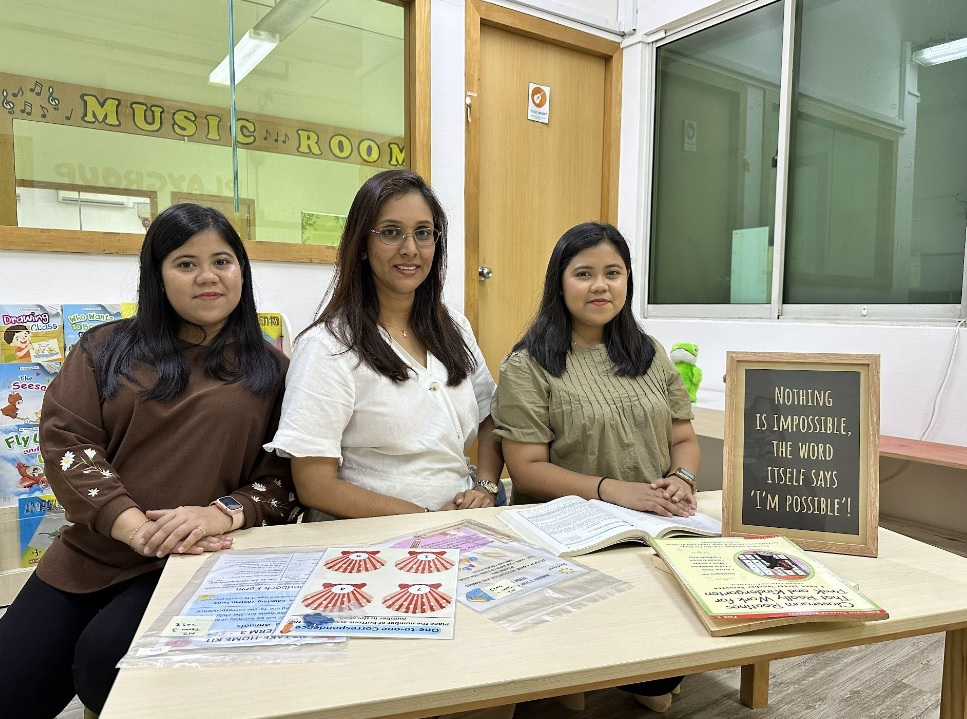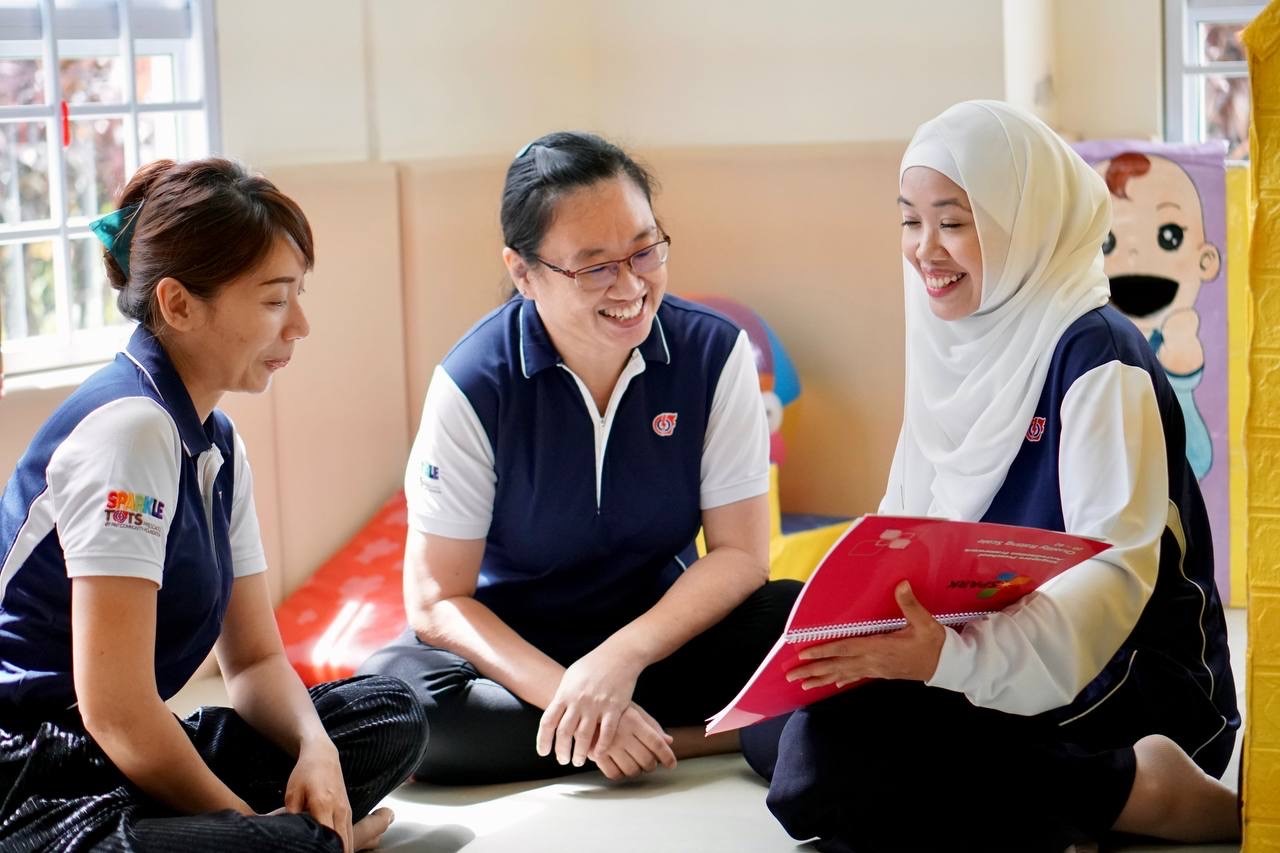Artful Conversations QandA


1. ”Hi, I have a question relating to how to develop the baby's reading habit since they were young...Below 3 years old” -Pichmolika Dara

It is important to read to your child, regardless of how young they are. It will get them interested in stories, and will also help with the parent-child bonding. Have your children see you read, as this would model the behaviour. Bring your child to the library; let them pick what they are interested in and read with them. What parents need to do is to monitor the theme of the books (nothing violent or inappropriate!) as well as the reading level required. Another thing is not to use reading as a punishment. For example, some parents will make their child go to a corner and read a book quietly for 15 minutes if they misbehave. Reading should be associated with enjoyment and fun, rather than something negative.
2. “Everytime I bring my child to library, he just run round. What should I do ? Would like to train him to get Reading interest Thx” - Fiona Lu

Before going to the library, remind your child that he has to walk and not run in the library and he must stay beside you at all times. At the library, place him on your lap and softly read books to him that have attractive and interesting illustrations. When you display a love for books, your child is likely to show an interest in books too. You could talk with your child about the artwork in children’s picture books. Point out interesting features in the artwork and encourage your child to tell you what he sees and what he thinks is happening. This will help build your child’s communication skills and vocabulary.
3. ”How do I get my child to be more attentive when teach him numbers and alphabets”- Susanna Arthur Daniel

Children are naturally Kinaesthetic learners. Play games that are novel with your child to keep him/her interested.
‘In and Out the Cherry Window’ game, using alphabets.
Set up: Gather at least 4 players in a circle holding hands and raising hands like a bridge. For every player, using a lanyard, write 1 alphabet on a card and sling the lanyard across shoulder. Let card face the back. The alphabet cannot be made known to the wearer.
How to play:
- The 5th player will be intertwining in and out the circle simultaneously singing ‘in and out the cherry window ( sing 3 times) I am the leader’
- When you get to the line ‘I am the leader’ the 5th player’s hand will land on the shoulder of the closest player.
- This chosen player will need to guess the alphabet behind him before he is accorded the role of leader. Depending on players age group, The 5th player may say the sound of the alphabet or name a word that starts with the letter.
- When the chosen player guesses the alphabet correctly, everyone proceed to sing ‘tapper tapper tapper, on my shoulder (x3) I am the leader’
- The chosen one gets to lead. Repeat step 1-3

Look at the illustration in children’s picture books together with your child. Rather than trying to teach numbers and letters of the alphabet, draw his attention to items in the picture by naming and counting while pointing to them. You can vary your tone, pitch, volume and speed.Most children love drawing. Sit beside your child and show an interest by talking to him and asking questions while he draws. This dynamic interaction from you encourages your child to communicate his thoughts and intentions to you or he may modify his drawings in response as you clarify, probe and think out loud throughout the drawing process.
4. ”How to get my 3yr old daughter to talk more? she is very quiet/shy. when other teacher talks to her she does not respond. My small child is very quiet in class, 3 years old, how to get her to talk more?”- Ronan Cai

Social interaction and novel experiences are key to learning without stress. Most importantly, be patient and create a secure environment such that your child doesn’t feel tested.
Step 1: Play familiar tunes/nursery rhymes during play times. Keep to the same tunes so that it becomes familiar to the child. Eg twinkle twinkle little stars, bingo, etc.
Step 2: Sing the tune without music background.
Step 3: Deliberately leave the last word of each phrase out and allow the child to ‘sing in’ the words.
5. ”Recently I have heard of a term 'retained primitive reflexes' and how it can affect a child's development. What is your take on this? An example includes having more core strengthening exercises to help to develop their brain and focus in class”- Wina Wina

New-borns have a set of reflexes (known as primitive reflexes) which usually disappears within the first year of life. If these reflexes persist beyond normal developmental stages, it would be prudent to have the child checked for possible reasons for this, such as traumatic birth, infections etc. To help children focus and pay more attention in class, there are simple strategies. Good nutrition, letting your child take breaks, reducing the number of distractions, setting shorter time goals and using positive reinforcements are strategies that all caregivers can use to help the child improve his or her attention.
Go back to Artful Conversations:Stories from the Past main page
You may also like

Translating Passion to Profession: Angelene, Nurziana and Sharidah's Voyage in Early Childhood Education
PDP has undoubtedly deepened the skill sets and enriched the expertise of exemplary educators such as (Nur)Ziana and Sharidah

Ms Jegatheswary
Cluster Head at Sunflower Preschool

From Cabin to Classroom: Journey of an Outstanding Early Childhood Educator
The PDP modules allowed me to get creative with lesson ideas and keep up with the ever-changing Early Childhood sector.

Ms Farhana Binte Mohamed Hassan
Early Years Educator - PCF Sparkletots @ Pioneer Block 987D (CC)

More Than Just a Place for Food
Young children are highly inquisitive, and learn most effectively with activities that allow exploration and experimentation.

Kinderland @ Yio Chu Kang